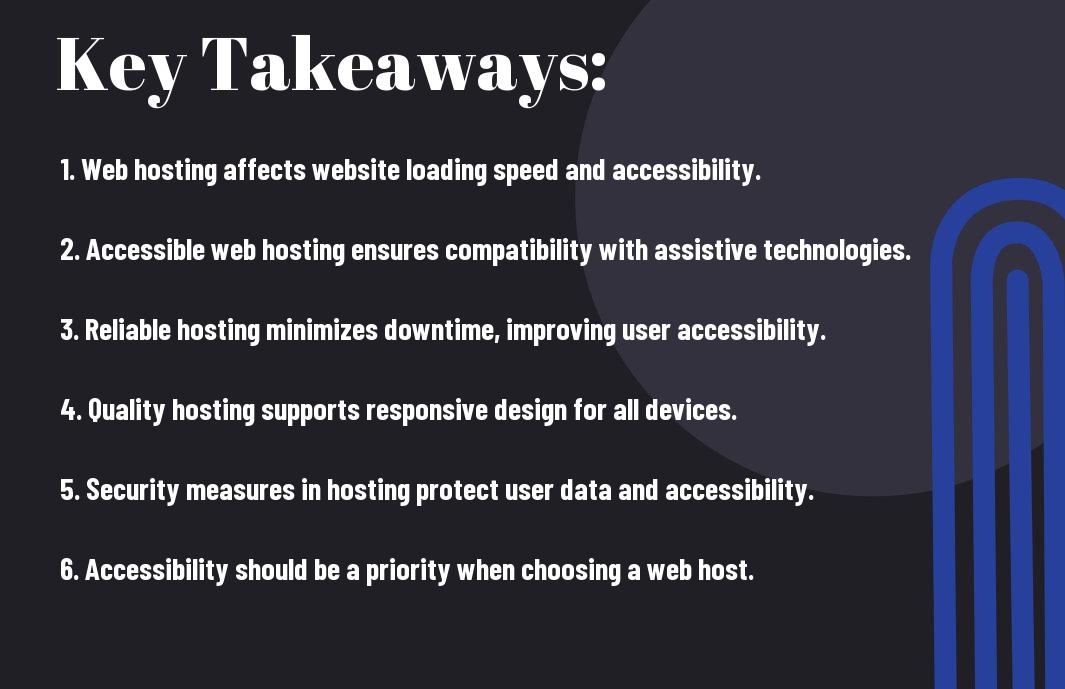Have you ever considered the profound impact that your web hosting provider can have on the accessibility of your website? The reliability and performance of your web host can directly affect how easily visitors with disabilities can access and navigate your site. From loading speed to compatibility with screen readers, every aspect of your web hosting contributes to the overall accessibility of your website. In this post, we will explore the key factors that link web hosting and website accessibility, and provide valuable insights on how you can ensure that your website is inclusive and accessible to all users. Whether you are a business owner, web developer, or simply someone who cares about making the internet a more inclusive space, understanding the impact of web hosting on website accessibility is crucial for creating a positive online experience for every visitor.
Key Takeaways:
- Web hosting greatly affects website accessibility by influencing factors such as server uptime, page loading speed, and security protocols.
- Choosing a reliable web hosting provider is crucial for maintaining website accessibility and ensuring a positive user experience for all visitors.
- Implementing web accessibility best practices alongside a reputable web hosting service can help improve user experience and ensure compliance with accessibility standards.

Understanding Web Hosting
Some of the most important aspects of website accessibility are influenced by the choice of web hosting. Third-Party Hosting and Your Obligations. can also play a significant role in determining the accessibility of your website. For more information on this, you can read Third-Party Hosting and Your Obligations.
Definition and Types of Web Hosting
When it comes to web hosting, it refers to the service that allows individuals and organizations to make their website accessible via the World Wide Web. There are several types of web hosting including shared hosting, dedicated hosting, VPS hosting, and cloud hosting. After considering your specific needs and budget, you can select the most suitable type of hosting for your website.
| Type of Web Hosting | Description |
| Shared Hosting | Multiple websites are hosted on a single server, sharing resources. |
| Dedicated Hosting | A single server is dedicated to a single website. |
| VPS Hosting | Virtual Private Server provides dedicated resources within a shared environment. |
| Cloud Hosting | Resources are spread across multiple servers, offering scalability and flexibility. |
Factors to Consider When Choosing a Web Host
When selecting a web host for your website, reliability, speed, security, support, and pricing should be taken into account. Perceiving your specific needs and the type of website you are running is crucial in making the best choice. You need to ensure that the web host you choose can meet your requirements and provide the necessary support for a fully accessible website.

Website Accessibility Basics
For website owners and developers, ensuring that your website is accessible to everyone is crucial. Website accessibility refers to the practice of making your site usable for people with disabilities, including visual, auditory, motor, or cognitive impairments. This involves designing and developing your website in a way that allows all users to navigate, understand, and interact with your content, regardless of their abilities.
Importance of Website Accessibility
Having an accessible website is not only inclusive but also essential for your business. By making your website accessible, you are ensuring that you are not excluding potential customers or visitors. It also improves your site’s usability for all users, leading to a better user experience and ultimately, increased customer satisfaction and retention. Furthermore, enhancing your website accessibility can also positively impact your SEO efforts, as search engines favor websites that are accessible to all users.
Legal Standards for Accessibility
There are legal standards and regulations in place that require websites to be accessible to all users. In some countries, including the United States, websites are required to comply with the Americans with Disabilities Act (ADA), which prohibits discrimination against individuals with disabilities in all areas of public life, including the Internet. Failure to meet these standards could result in costly legal action, including lawsuits and fines. It is crucial to familiarize yourself with the legal requirements for website accessibility to ensure that you are compliant and protect your business from potential legal ramifications.
Analyzing the Impact of Web Hosting on Accessibility
Keep in mind that the web hosting you choose can significantly impact the accessibility of your website. In this section, we will analyze the key factors that influence website accessibility in relation to web hosting.
Server Uptime and Reliable Hosting
When it comes to accessibility, server uptime and reliable hosting are critical. If your website experiences frequent downtime due to unreliable hosting, it can greatly impact accessibility for your users. Prolonged periods of downtime can lead to frustration and inconvenience for your visitors, and may even result in lost opportunities for engagement and conversions. It is essential to choose a hosting provider that guarantees a high level of uptime and provides reliable services to ensure your website is consistently accessible to users.
Web Hosting Features Supporting Accessibility
Another significant factor to consider is the web hosting features that support accessibility. Look for hosting providers that offer robust features such as support for assistive technologies, compliance with accessibility standards, and the ability to optimize website performance for users with disabilities. These features can play a crucial role in ensuring that your website is accessible to all users, regardless of their individual needs or limitations. By selecting a hosting provider that prioritizes accessibility, you can demonstrate your commitment to inclusivity and provide a positive user experience for all visitors.
Improving Accessibility through Web Hosting Choices
Not all web hosting providers prioritize accessibility, but your choice of web hosting can greatly impact the accessibility of your website. For a deeper understanding of the role of web hosting in website accessibility, you can check out this article on The Role of Web Hosting in Website Accessibility.
Selecting the Right Hosting for Enhanced Accessibility
When selecting web hosting for your website, it’s crucial to prioritize accessibility. Look for hosting providers that offer reliable uptime and fast loading speeds, as these are essential for an accessible website. Additionally, make sure the hosting provider offers scalability and flexibility to accommodate the growth and development of your website.
Best Practices in Web Hosting for Accessibility
Best practices in web hosting for accessibility include choosing a hosting provider that offers robust security measures to protect your website from potential threats. Additionally, look for hosting that provides 24/7 support to address any accessibility issues that may arise. Lastly, opt for hosting that offers automatic backups to safeguard your website’s content and data.
The Impact of Web Hosting on Website Accessibility
To wrap up, it is crucial to understand the significant impact that web hosting has on website accessibility. By choosing the right web hosting provider and ensuring that your website is compatible with different devices and accessibility tools, you can make your website accessible to a wider audience. It is important to consider factors such as uptime, speed, security, and support when selecting a web hosting provider to ensure that your website is as accessible as possible. By prioritizing website accessibility, you are not only making your site more inclusive, but you are also potentially reaching a larger and more diverse audience. In sum, web hosting plays a crucial role in website accessibility, and it is essential to make informed decisions to ensure that your website is accessible to all users.
FAQ
Q: What is website accessibility?
A: Website accessibility refers to the inclusive practice of designing and developing websites that can be used by people of all abilities and disabilities. This includes people with auditory, cognitive, neurological, physical, speech, and visual disabilities.
Q: How does web hosting impact website accessibility?
A: Web hosting can impact website accessibility in several ways. The speed and reliability of a web hosting provider can directly affect the accessibility of a website. Slow loading times and frequent downtime can hinder the experience for users with disabilities who rely on assistive technologies.
Q: What features should I look for in a web hosting provider to improve website accessibility?
A: Look for a web hosting provider that offers reliable and fast hosting services. Additionally, consider a hosting provider that offers accessibility support, such as features that enable you to optimize your website for screen readers, keyboard navigation, and other assistive technologies.
Q: How can I ensure my website is accessible to all users?
A: To ensure your website is accessible to all users, you should follow the Web Content Accessibility Guidelines (WCAG). This includes using alt text for images, providing captions for videos, using clear and logical navigation, and ensuring proper color contrast for text readability.
Q: Can website accessibility affect my SEO efforts?
A: Yes, website accessibility can impact your SEO efforts. Search engines like Google prioritize websites that are accessible to all users. By improving your website’s accessibility, you can potentially improve your search engine rankings, leading to increased visibility and traffic.
CATEGORY:Uncategorized

